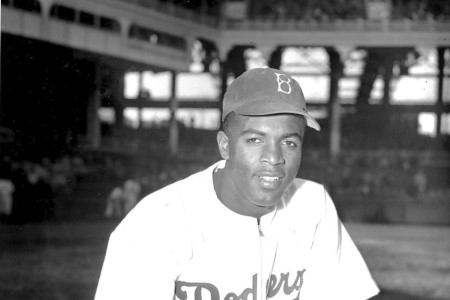Jackie Robinson
Jack Roosevelt Robinson, born on January 31, 1919, and passing away on October 24, 1972, forever altered the landscape of American professional baseball as the first African American to break the color barrier in Major League Baseball (MLB) during the modern era. His historic debut with the Brooklyn Dodgers on April 15, 1947, marked a pivotal moment in the fight against racial segregation in professional sports, dismantling barriers that had long confined black players to the Negro leagues since the 1880s. Robinson’s courageous stance and exceptional talent propelled him into the annals of baseball history, culminating in his induction into the Baseball Hall of Fame in 1962.
Born in Cairo, Georgia, and raised in Pasadena, California, Robinson excelled as a four-sport student athlete at Pasadena Junior College and the University of California, Los Angeles (UCLA), gaining prominence in football before transitioning to baseball. Despite his stellar college football career with the UCLA Bruins, Robinson’s journey to MLB was fraught with challenges, including a court martial for refusing to adhere to segregationist policies during World War II. His subsequent stint with the Kansas City Monarchs of the Negro leagues caught the attention of Branch Rickey, the visionary general manager of the Brooklyn Dodgers, who recognized Robinson’s potential to break the color line in professional baseball.
Throughout his illustrious 10-year MLB career, Robinson shattered barriers and shattered records. He secured the inaugural Rookie of the Year Award in 1947, earned All-Star honors for six consecutive seasons from 1949 to 1954, and clinched the National League (NL) Most Valuable Player Award in 1949—a groundbreaking achievement for a black player. Robinson’s impact extended beyond individual accolades, as he played a pivotal role in guiding the Dodgers to victory in the 1955 World Series, cementing his legacy as a transformative figure in the sport.
In recognition of his monumental contributions, Major League Baseball retired Robinson’s uniform No. 42 across all major league teams in 1997, a testament to his enduring legacy as a trailblazer. The establishment of “Jackie Robinson Day” on April 15, 2004, further commemorates his groundbreaking achievements, with every player across MLB donning the No. 42 jersey in his honor.
Beyond his athletic prowess, Robinson’s unwavering commitment to nonviolence and social justice reverberated far beyond the baseball diamond. He challenged entrenched segregationist practices and inspired a generation to confront systemic racism, leaving an indelible mark on the civil rights movement. Robinson’s groundbreaking tenure as the first black television analyst in MLB and his pioneering role as the first black vice president of a major American corporation underscore his enduring impact on American society.
In the 1960s, Robinson’s commitment to economic empowerment led to the establishment of the Freedom National Bank, a landmark African-American-owned financial institution based in Harlem, New York. His legacy lives on through posthumous honors, including the Congressional Gold Medal and the Presidential Medal of Freedom, which recognize his unparalleled achievements both on and off the baseball field. Jack Roosevelt Robinson’s extraordinary life and enduring legacy serve as a beacon of courage, resilience, and social progress for generations to come.
The use of images or names herein does not necessarily imply any form of management or representation or that The Celebrity Group was wholly responsible for a specific endorsement. The Celebrity Group works in partnership with many agents & managers for the supply of celebrities not represented by ourselves.



